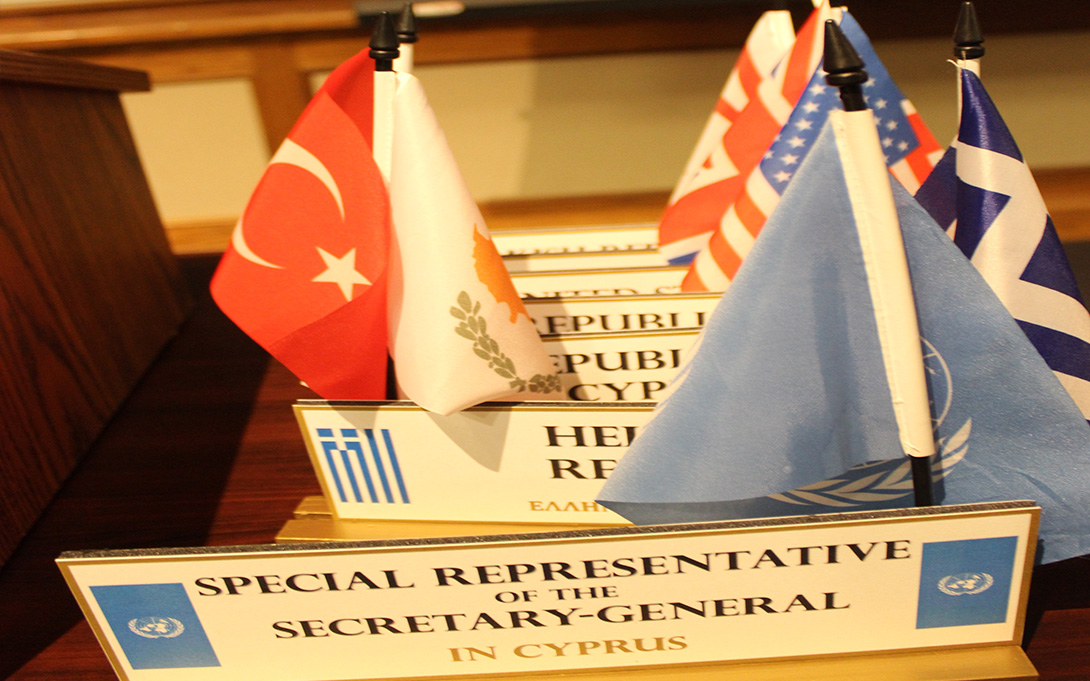
Four current and former army officers stood before a set of maps on a screen in the Betty Ford auditorium, giving background on the on-going diplomatic standoff in Cyprus. The audience consisted of 24 undergraduate and graduate students from the Ford School and other U-M units, who were taking part in a two-day International Strategic Crisis Negotiation Exercise, presented by the U.S. Army War College (USAWC). It’s the fourth time USAWC has worked with the Ford School, one of 15 universities they currently engage.
Lt. Colonel Nathaniel Davis, a U-M graduate (!), told the group, “We are a war college, but peace is our goal.” The students adopted roles in the simulation as members of delegations representing the governments of the U.S., U.K., Cyprus, Greece, Turkey, and the internationally-unrecognized Republic of Northern Cyprus.
At the start, Weiser Diplomacy Center (WDC) director Professor and retired ambassador Susan D. Page told them, “You may not get the result you expect. It may be better or worse than you had hoped. But the goal is to understand the process, so keep an open mind.”
That practical approach to learning about diplomacy extends to the WDC’s activities throughout the year.
It starts with the faculty. Page is a former U.S. diplomat, attorney-adviser, and senior U.N. official with decades of experience in numerous African countries, Nepal, and Haiti. Other WDC-affiliated professors include former ambassador Mel Levitsky, whose career included senior State Department roles as well as ambassadorships in Bulgaria and Brazil, former FBI and NSC counterterrorism official Javed Ali, and former Minister of Foreign Affairs for the Republic of Mali, Ambassador Kamissa Camara. Kseniya Yurtayeva, an associate professor at Kharkiv National University of Internal Affairs in Ukraine, remains as a visiting scholar.
“As policy practitioners, we can share our real life experiences,” Page says.
She continues, “I have lived more than most of my professional life overseas in what some people call ‘the Global South.’ And so I have expertise in different areas and connections and contacts in those places. I've also seen things from those people's perspectives because I've lived with them. And I have seen the challenges and the faults that we sometimes make as U.S. policymakers because we don't bother to understand the local context and the history.”
Camara, the most recent addition, is teaching a class on great power competition, looking not only at the rise of typical powers such as the U.S., China, and Russia, but also Turkey, Greece, and Germany.
Also providing practical policy experience are visiting experts like Ambassador Dan Shields, whose long career was spent mostly in Asian countries, including as ambassador to Brunei. He is teaching a class on Asia and the Pacific, which also included simulations.
The Ford School hosts the State Department's regional home for a diplomat-in-residence, which this year is again Lou Fintor. He informs students of career possibilities in the foreign and civil service, as well as the Pickering, Rangel, and Payne Fellowships, which give substantial tuition support and an on-ramp for students to join the foreign service of the U.S. Department of State or the U.S. Agency for International Development (USAID) upon completion of the rigorous fellowship program.
The Weiser Diplomacy Fellowships and Rumsfeld Foundation Graduate Fellowships also offer financial assistance to students interested in international diplomacy and development.
Page says the academic goal of WDC is to offer faculty support “to try to help them to globalize, not so much their syllabi, but their outlook.”
One practical opportunity for the students is participation in the State Department’s Diplomacy Lab, in which they wrestle with a real-world issue and try to offer novel solutions. Those suggestions are often applied.
As the year goes on, students will be able to participate in the EU Schumann Challenge, events sponsored by the American Academy of Diplomacy, and many other immersive activities.
Page notes that the ongoing war in Ukraine will continue to demand attention. And she wants to apply her experience in the Global South to looking at extractive industries and expanding STEM education in Low and Middle Income Countries. Addressing the inequity in locally-sourced medicines and manufacturing are vital.
“If countries cannot manage, don't have the tools to develop that aspect of their own, you know, countries and economies, they will always be dependent on somewhere else.”
More news from the Ford School